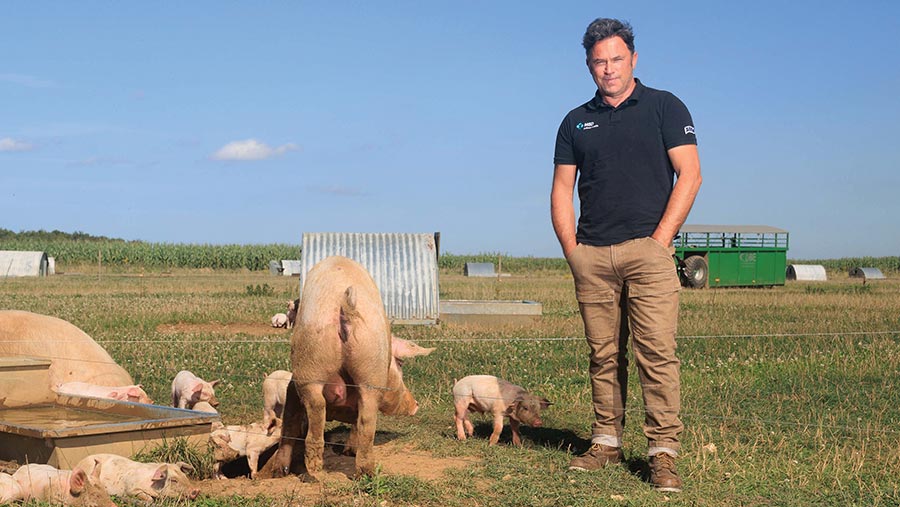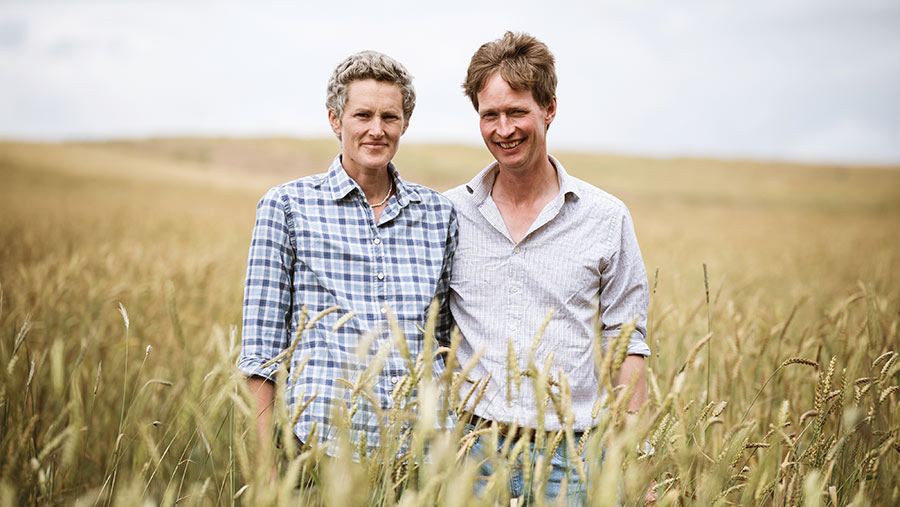Farmers Weekly Awards 2023: Environmental Champion finalists

The winner of this award, chosen from the finalists in the other Awards categories, is the farmer judged to have made the most positive impact on the wider environment and the sustainability of their farming activities.
That could involve improving soil quality, reducing the negative effects of pesticides, increasing biodiversity, reducing greenhouse gas emissions, enhancing water management or any other environmental improvements.
See also: Farmers Weekly Awards: 2023 shortlist announced
The finalists
-
Guy King, GSK Pigs, Dereham, Norfolk – Pig Farmer of the Year finalist
-
Emma and James Loder-Symonds, Nonington Farms, Kent – Arable Farmer of the Year finalists
Judging criteria
The judges considered the scale of each finalist’s environmental ambitions, and the degree of innovation entailed.
They also looked at how ideas have been embedded into farm management practices, the impact of these actions, and what is being done to measure and monitor results.
Guy King
GSK Pigs, Dereham, Norfolk

© Tim Scrivener
Care for the environment is central to the management of Guy King’s nine outdoor pig units across Norfolk and Suffolk.
This is most clearly shown by his commitment to ensuring he has green cover on all his units to protect water quality and soil structure.
Guy runs a total of 8,600 sows as part the arable rotation on his landlords’ farms.
He has worked with Catchment Sensitive Farming to reduce diffuse pollution and run-off so that soil and nutrients do not end up in watercourses.
To establish and maintain a sward that is resilient enough to last a two- to three-year rotation with pigs is no easy feat.
But, through trial and error, he is now achieving this (even through harsh summers and winters) on at least 60% of paddocks, year-round.
Even if some green cover is lost, the rooting system is still in place, maintaining soil structure, he says.
“I can sleep soundly now because I know that even if there is very heavy rainfall, there won’t be soil running off the fields,” he adds.
Grass follows a cereal crop with seed sown into stubble using minimum tillage before pigs are stocked on ground the following March.
Guy has found a mix of Timothy, cocksfoot, fescues and clover works best to produce a resilient and tufty sward with deep roots. His landlords follow pigs with a crop that is hungry for nitrogen, such as maize.
Feed wastage and soil damage are minimised by using long troughs or individual bird-proof feeders rather than feeding directly on the ground.
Guy has also switched to Tier 4 low-emissions diesel engines across the units to improve fuel efficiency, and only works with waste companies that commit to recycling 100% of plastic waste.
The judges
- David Fulton, last year’s winner
- Judith Tooth, Farmers Weekly livestock editor
- Charlie Dewhirst, independent judge and NPA senior policy adviser
What the judges say:
“Guy’s green paddocks are far from the mud and dust that were once typical of outdoor pig setups. His determination to establish and maintain grass leys on his nine units shows commitment to protect soil and water quality”
Emma and James Loder-Symonds
Nonington Farms, Kent

© MAG/Colin Miller
Soil health and biodiversity are at the heart of Emma and James’s regenerative cropping system, which has increased bird and insect numbers and reduced the farm’s carbon footprint.
The couple began their regenerative farming journey in 2017 and now their system includes extensive cover crops as part of a diversified rotation.
They have integrated livestock into their arable system and are being paid by Southern Water to grow herbal leys with the aim of improving water quality.
Nonington is a Linking Environment and Farming (Leaf) demonstration farm and Countryside Stewardship accounts for 20% of the area.
Over the past few years, the business has become carbon negative. This has been in part due to diesel use falling by 35% since 2018 and more efficient fertiliser application has seen its use halved.
Emma and James also aim to plant 1,000m of hedges and more than 400 trees a year.
But it’s not just on their farm that Emma and James are making a difference. The pair are involved in three cluster groups that they founded with Natural England, including the Barnham Downs East Kent group.
They have a close working relationship with their local Natural England adviser, and volunteers help monitor plants, insects and birds.
Records show substantial increases in bird numbers such as grey partridge and the discovery of new species on the farm including the Queen of Spain fritillary butterfly.
As if that isn’t enough to keep them occupied, Emma’s background in teaching and passion to engage with the community has seen the couple host more than 1,500 visitors a year (of all ages) in a bid to educate and promote the environmental benefits of their cropping system.
The judges
- Will Oliver, last year’s winner
- Richard Allison, Farmers Weekly arable editor
- Damian McAuley, independent judge and AICC agronomist
What the judges say:
“Emma and James have seen a remarkable increase in diversity since adopting their regenerative farming system. We were impressed with their efforts in engaging the wider community and sharing their successes.”
Sponsor’s message
 The Farmers Weekly 2023 Environmental Champion of the Year is sponsored by Woodland Trust.
The Farmers Weekly 2023 Environmental Champion of the Year is sponsored by Woodland Trust.
“The Woodland Trust has been working with farmers throughout its 50-year history and there has never been a more important time to come together. We are proud to celebrate farmers who champion the environment in their work.”
Darren Moorcroft, chief executive
